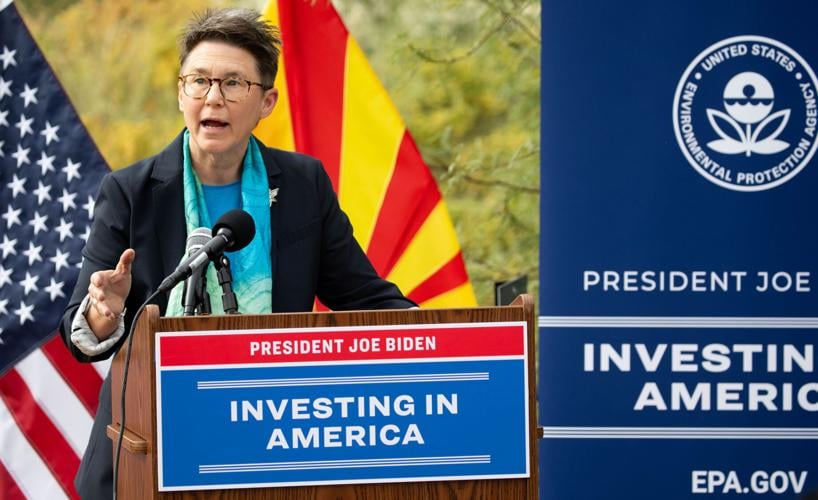The Environmental Protection Agency is investing $30 million to help protect Tucson’s water supply from “forever chemicals.”
The money will help Tucson Water build a second water treatment facility for wells on the metro area’s northwest side, said Tucson Water Director John Kmiec.
One of the first projects will be reopening more than 28 wells on the northwest side of Tucson, Kmiec said Thursday after the funding was announced at a news conference here. City officials began testing all of the drinking wells a few years ago and identified more than two dozen that had to be shut down due to PFAS chemicals being found in the water.
The wells, dubbed the “northwest wells” would primarily serve for Tucson Water customers in that area, including those in Marana, he said.
“By having those wells come back into the Tucson water portfolio, through advanced treatment, we’ll be able to recover 3.7 million gallons a day of potable drinking water that then can be returned to the northwest side of Tucson,” Kmiec said Thursday. “In Tucson we have enough water to thrive but not enough to waste ... That’s why investments in water quality protection projects like these are so important for the future of our community.”
The plan has an estimated cost of about $30 million total, with more than $10 million from the Bipartisan Infrastructure Act.
Radhika Fox, the EPA’s assistant administrator for water, said during the news conference that she appreciates that Tucson treats its water “with the respect every drop deserves.”
“No person in this country should wonder whether their drinking water is safe from PFAS, she said.
Fox continued to say that Tucson’s One Water 2100 plan, which seeks to set a course for how water will be managed here for the next nearly 80 years, is a model for the nation. The city’s water management and conservation plan for the rest of the century approaches water resources as all equally important, with a goal to decrease the region’s reliance on the Colorado River while simultaneously increasing Tucson’s use of recycled water.
“We’re focused on turning the tap off on PFAS, really restricting these chemicals (and) stopping them from getting into our air, water and land in the first place,” Fox said. “I think Tucson knows better than maybe any community about once it gets in, just how complicated and complex it is to get the PFAS out.”
The Bipartisan Infrastructure Deal, which passed in November 2021, is set to invest $55 billion in drinking water infrastructure across the country as well as $21 billion to clean up “legacy pollution” in former industrial and energy-producing sites.
The deal also is set to invest $65 billion in high-speed internet; $110 billion in highways and roads; $39 billion in improvements to public transportation systems; $17 billion towards port infrastructure and $25 billion to airports; $66 billion in passenger rail systems; $7.5 billion for improving the country’s national network for electric vehicles and charging; $65 billion for clean and reliable energy, as well as over $50 billion in investments for improving cyber security and the nation’s fight against climate change.
The federal investment is critical for ensuring a safe and secure future for water in Tucson, Mayor Regina Romero said in a prepared statement.
“The investments made possible by the funding provided by the Bipartisan Infrastructure Law are critical to Tucson. My colleagues on the Tucson City Council and I have made addressing this serious threat, the threat of emerging contaminants, our top priority.”





